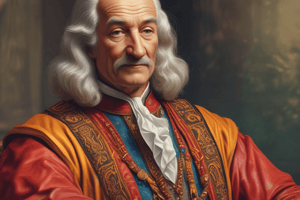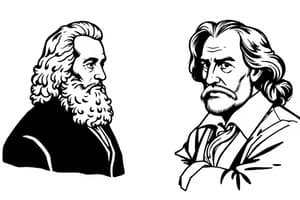Podcast
Questions and Answers
Which of the following distinguishes the ideas of Thomas Hobbes and John Locke?
Which of the following distinguishes the ideas of Thomas Hobbes and John Locke?
- Hobbes believed that authority should be held by those governed.
- Locke believed that the governing ruler or body should have ultimate authority.
- Locke believed that authority should be held by those governed. (correct)
- Hobbes believed that the governing ruler or body should have ultimate authority. (correct)
How did Thomas Hobbes describe human life without the state?
How did Thomas Hobbes describe human life without the state?
solitary, poor, nasty, brutish, and short
What major event occurred two years before Thomas Hobbes wrote Leviathan?
What major event occurred two years before Thomas Hobbes wrote Leviathan?
Charles I was beheaded
Whose theories of government influenced the Glorious Revolution, American Revolution, and French Revolution?
Whose theories of government influenced the Glorious Revolution, American Revolution, and French Revolution?
Whose separation of powers proposal influenced the Constitution of the United States?
Whose separation of powers proposal influenced the Constitution of the United States?
The ideals expressed in the American Declaration of Independence were influenced most by which two thinkers?
The ideals expressed in the American Declaration of Independence were influenced most by which two thinkers?
Abigail Adams wrote, 'Remember all men would be __________ if they could.'
Abigail Adams wrote, 'Remember all men would be __________ if they could.'
In what year was the Constitution of the United States written?
In what year was the Constitution of the United States written?
A social __________ is the theory that the authority for government is derived from an agreement between individuals and the state.
A social __________ is the theory that the authority for government is derived from an agreement between individuals and the state.
According to John Locke, what is the purpose of government?
According to John Locke, what is the purpose of government?
Whose ideas are followed by the division of the U.S. government into three branches?
Whose ideas are followed by the division of the U.S. government into three branches?
According to Adam Smith, wealth in the natural economic order is based primarily on what?
According to Adam Smith, wealth in the natural economic order is based primarily on what?
The philosophes were interested in developing new ideas, but felt that intellectual pursuits could not impact society.
The philosophes were interested in developing new ideas, but felt that intellectual pursuits could not impact society.
Who were the writers of the famous Encyclopédie?
Who were the writers of the famous Encyclopédie?
What were some accomplishments of Madame du Châtelet?
What were some accomplishments of Madame du Châtelet?
What was the goal of Diderot's Encyclopédie?
What was the goal of Diderot's Encyclopédie?
Who is the philosopher behind 'philosophical optimism'?
Who is the philosopher behind 'philosophical optimism'?
Cesaré de Beccaria championed reform of what?
Cesaré de Beccaria championed reform of what?
What did Nicholas de Condorcet envision in his Sketch for a Historical Picture of the Progress of the Human Mind?
What did Nicholas de Condorcet envision in his Sketch for a Historical Picture of the Progress of the Human Mind?
Which 18th century figures explicitly argued for women's rights?
Which 18th century figures explicitly argued for women's rights?
What impact did the rise of newspapers and periodicals in the 18th century have on prose style?
What impact did the rise of newspapers and periodicals in the 18th century have on prose style?
What is the poetic form known as that Alexander Pope used for his satires?
What is the poetic form known as that Alexander Pope used for his satires?
Who is the author of A Vindication of the Rights of Women?
Who is the author of A Vindication of the Rights of Women?
The novel first appeared in __________ and ___________.
The novel first appeared in __________ and ___________.
What literary forms rose during the Enlightenment?
What literary forms rose during the Enlightenment?
Flashcards
Thomas Hobbes' View on Government
Thomas Hobbes' View on Government
Believed rulers should have absolute authority; life without government would be 'solitary, poor, nasty, brutish, and short'.
John Locke's Philosophy
John Locke's Philosophy
Argued government authority comes from the people's consent, emphasizing the preservation of individual rights.
Montesquieu's Idea
Montesquieu's Idea
Advocated dividing government power into executive, legislative, and judicial branches.
Locke's Influence
Locke's Influence
Signup and view all the flashcards
Abigail Adams' Advocacy
Abigail Adams' Advocacy
Signup and view all the flashcards
Mary Wollstonecraft's Argument
Mary Wollstonecraft's Argument
Signup and view all the flashcards
Social Contract Theory
Social Contract Theory
Signup and view all the flashcards
Adam Smith's Economic Theory
Adam Smith's Economic Theory
Signup and view all the flashcards
Goal of the 'Encyclopédie'
Goal of the 'Encyclopédie'
Signup and view all the flashcards
Gottfried Leibniz's view
Gottfried Leibniz's view
Signup and view all the flashcards
Cesare Beccaria's focus
Cesare Beccaria's focus
Signup and view all the flashcards
Condorcet's Vision
Condorcet's Vision
Signup and view all the flashcards
Impact of Newspapers
Impact of Newspapers
Signup and view all the flashcards
Origin of the Novel
Origin of the Novel
Signup and view all the flashcards
Alexander Pope's poetic style
Alexander Pope's poetic style
Signup and view all the flashcards
Enlightenment Legacy
Enlightenment Legacy
Signup and view all the flashcards
Madame du Chatelet's Expertise
Madame du Chatelet's Expertise
Signup and view all the flashcards
Study Notes
Key Philosophers and Their Ideas
- Thomas Hobbes believed in absolute authority for rulers, envisioning life without government as "solitary, poor, nasty, brutish, and short."
- John Locke argued for government authority derived from the consent of the governed, emphasizing preservation of their rights.
- Montesquieu advocated for a separation of powers into three branches (executive, legislative, judicial), influencing the U.S. Constitution.
Key Historical Context
- Hobbes published "Leviathan" posthumously in 1651, shortly after the beheading of Charles I.
- Locke's ideas significantly influenced the Glorious, American, and French Revolutions, shaping modern democratic principles.
Women's Rights and Advocacy
- Abigail Adams urged her husband, John Adams, to consider women's rights, indicating men could become tyrants if given the chance.
- Mary Wollstonecraft authored "A Vindication of the Rights of Women," asserting women's equality and rights.
Enlightenment Developments
- The U.S. Constitution was drafted in 1787, reflecting Enlightenment ideals.
- The concept of a social contract suggests governance stems from an agreement between individuals and their government.
Economic Theories
- Adam Smith highlighted that wealth arises from the labor of self-interested individuals, laying the foundation for modern economic thought.
Contributions to Knowledge
- Denis Diderot and Voltaire were key figures behind the "Encyclopédie," aimed at societal transformation through disseminating knowledge.
- Madame du Chatelet made significant contributions to mathematics, physics, and translating classical works into French.
Progression of Ideas
- Gottfried Leibniz promoted "philosophical optimism," positing our world as better than others.
- Cesare Beccaria advocated for prison reforms, highlighting humane treatment for inmates.
Vision for the Future
- Nicholas de Condorcet envisioned advancements like universal education, a guaranteed livelihood for the elderly, and reduced work hours in his work "Sketch for a Historical Picture of the Progress of the Human Mind."
Cultural Shifts
- The rise of newspapers and periodicals in the 18th century made prose more informal and accessible.
- The novel form originated in China and Japan, marking significant literary development during this period.
Literary Contributions
- Alexander Pope was notable for his use of heroic couplets in satires and translations, particularly of Homer.
Legacy of the Enlightenment
- The Enlightenment heralded the emergence of influential literary forms, including the novel, encyclopedia, and newspaper, reshaping communication and knowledge dissemination.
Studying That Suits You
Use AI to generate personalized quizzes and flashcards to suit your learning preferences.




